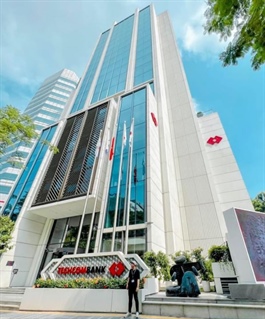Banks proactive to ensure profitability
Banks proactive to ensure profitability
The initial public offerings of major securities firms mark the first shot in the race among the banking-securities-insurance triad, laying the foundation to build a multi-billion-dollar financial ecosystem.
The financial industry’s attention is now centred on VPBank’s plan to launch an initial public offering (IPO) for its subsidiary VPBank Securities in November, with around 10 per cent of its shares expected to be offered to the market.

Many banks are restructuring by reallocating capital into higher-margin segments, photo Le Toan |
On August 18, VPBank Securities announced a resolution of its board of directors to finalise the list of shareholders for collecting written opinions. The process will take place from August 28 to September 8, although the specific agenda has not yet been disclosed.
Beyond VPBank Securities, the market is also eyeing the IPO of Techcom Securities. On August 5, Techcom Securities announced an indicative offering price of $1.87 per share, equivalent to a market capitalisation of approximately $4.1 billion.
The subscription and deposit period runs from August 19 to September 8, with a minimum of 100 shares and a 10 per cent deposit of the total purchase value. Such a valuation could potentially propel Techcom Securities past SSI to become the market leader by capitalisation.
If VPBank Securities’ IPO proceeds as scheduled, the year will close with another major listing, extending the ongoing wave of IPOs. The entry of large-scale banks and securities firms is expected to reshape the competitive landscape, which for years has been dominated by players such as SSI and Ho Chi Minh City Securities Corporation.
Under mounting pressure from declining profitability, many banks are proactively restructuring their strategies by reallocating capital into higher-margin segments, most notably through expanding their financial ecosystems via acquisitions in securities, asset management, and insurance.
At its extraordinary general meeting held in late July, PGBank approved a resolution to acquire shares in a securities company, fund management company, or insurance firm, with the intention of converting them into subsidiaries or affiliates.
At its AGM in April, Sacombank approved a plan to acquire a securities company with an ownership stake of over 50 per cent, valued at up to $60 million.
Explaining the rationale behind acquiring a securities company, a Sacombank executive noted, “Several banks have already successfully executed this model through their ownership of securities companies. Therefore, investing in and acquiring stakes in a securities firm will enable Sacombank to strengthen its fee-based income and competitive positioning.”
Similarly, MSB and SeABank also received shareholder approval to invest in or acquire stakes in securities firms and fund management companies, with the aim of converting these entities into subsidiaries.
In fact, in 2024, bank-affiliated securities companies like Techcom Securities contributed nearly 20 per cent of banks’ profits.
According to VIS Rating experts, expanding into the securities sector not only enables banks to increase fee-based income but also allows them to leverage their extensive customer networks to develop a more integrated financial ecosystem. However, such expansion tends to weigh on the capital adequacy ratio (CAR) in the short term.
“This indicates that banks are willing to trade off a key financial health indicator in order to capture new growth opportunities. As CAR declines, the pressure to raise charter capital will mount, especially as Basel II and Basel III requirements are enforced more stringently. In fact, this dynamic could even constrain banks’ ability to expand credit in the near term,” said VIS Rating.
VIS Rating noted that banks and their affiliated securities firms often work closely together to finance large corporations, particularly in real estate and renewable energy, through corporate lending, bond investments, or margin lending.
“Bank-affiliated securities firms typically capitalise on the funding capacity and customer base of their parent banks to expand brokerage market share and bond distribution. This creates a competitive edge that independent securities companies find difficult to match,” they added. “We expect bank-affiliated firms, especially those linked to private banks, to continue driving industry profit growth over the next 12-18 months.”
Maintaining a cautious stance, VIS Rating underscored that the nexus between banks and their securities affiliates must be managed with stronger discipline, particularly regarding corporate bond-related activities.
“To mitigate credit losses, it is essential for banks and affiliated securities firms to establish rigorous client selection criteria and to strengthen collateral management,” stated VIS Rating.
- 09:58 27/08/2025



























